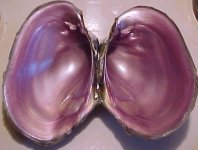Caitlin
Well-known member
Science Daily ? North America?s diverse community of freshwater mussels has been on the decline for decades and is presently considered one of the continent?s most endangered groups of animals. The reasons for this continued decline are examined in a special section of the latest issue of Environmental Toxicology and Chemistry.
Mussels are a critical component of the food chain because they are a food source for aquatic and terrestrial vertebrates, and they provide nutrient and energy cycling in streams and lakes by filtering algae, bacteria, and organic matter from the water column.
While 35 species of mussels are already extinct, 70 are listed as threatened or endangered, and nearly 180 species are critically imperiled or vulnerable. Species declines are likely due to a number of problems, including construction of dams, sedimentation, population, channelization, dredging, and introduction of exotic species.
The most important factors that can be controlled by man are water pollution and changes in physical habitat. For example, mussels were found to be highly sensitive to copper, ammonia, and several pesticides. In fact, available data suggest that current water quality standards for copper may not protect mussels in Oklahoma and possibly other states. Finally, ammonia has been identified as an issue in North Carolina.
Until recently, no standardized methods were available to help direct research, leading to lack of repeatability, and data variability which led to difficulties in comparing data among laboratories. This adversely affected scientists? abilities to understand the relative sensitivity of mussels to chemicals.
The studies in this report discuss the validation of a new standard toxicity test in mussels and will likely result in increased testing of these organism and inclusion of these species in water quality decision-making.
Note: This story has been adapted from a news release issued by Allen Press.
Mussels are a critical component of the food chain because they are a food source for aquatic and terrestrial vertebrates, and they provide nutrient and energy cycling in streams and lakes by filtering algae, bacteria, and organic matter from the water column.
While 35 species of mussels are already extinct, 70 are listed as threatened or endangered, and nearly 180 species are critically imperiled or vulnerable. Species declines are likely due to a number of problems, including construction of dams, sedimentation, population, channelization, dredging, and introduction of exotic species.
The most important factors that can be controlled by man are water pollution and changes in physical habitat. For example, mussels were found to be highly sensitive to copper, ammonia, and several pesticides. In fact, available data suggest that current water quality standards for copper may not protect mussels in Oklahoma and possibly other states. Finally, ammonia has been identified as an issue in North Carolina.
Until recently, no standardized methods were available to help direct research, leading to lack of repeatability, and data variability which led to difficulties in comparing data among laboratories. This adversely affected scientists? abilities to understand the relative sensitivity of mussels to chemicals.
The studies in this report discuss the validation of a new standard toxicity test in mussels and will likely result in increased testing of these organism and inclusion of these species in water quality decision-making.
Note: This story has been adapted from a news release issued by Allen Press.

